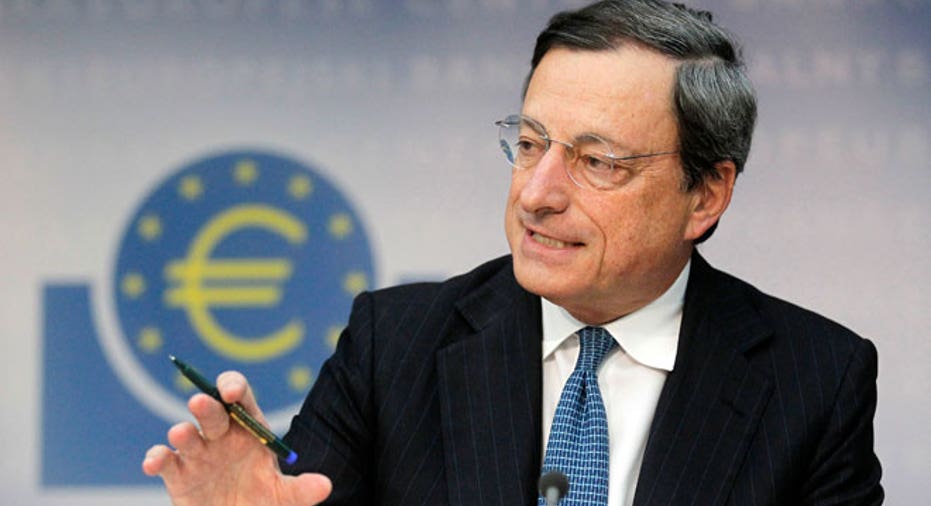ECB and Draghi Say 'Go Big or Go Home'

European Central Bank President Mario Draghi on Thursday adhered to the clichéd adage “Go big or go home.” And for the most part Draghi was praised for putting the ECB’s money where his mouth is.
“For quantitative easing to have the best chance of succeeding in the Eurozone, the ECB needed to act big, and it has delivered on that front,” said analysts at research firm IHS Global Insight.
The ECB revealed the details of its widely-anticipated stimulus program on Thursday and the only surprise in the announcement lay in the size of the bank’s monthly purchases.
In a press conference, Draghi said the central bank would begin buying 60 billion in euros, or about $69.7 billion, each month, or about 10 billion more euros than analysts had predicted. In all, when the program is completed in September 2016 the ECB will have purchased a total of 1.1 trillion euro.
Europe has been teetering on the brink of dangerous deflation for years, having never fully recovered from the sovereign debt crisis that nearly bankrupted a handful of euro zone countries five years ago. Europe’s unemployment rate stands at 11.5% and growth in the region is running at a paltry 1%.
The ECB said the aim of the QE program is to push Europe’s inflation rate up to about 2%, or a level that would indicate wages and prices are rising at healthy levels. If that doesn’t happen by the end of the first round of European QE, the bank said the program could be continued.
U.S. stock markets had priced in a European stimulus program weeks ago, as Draghi and other euro zone monetary policy leaders have been telegraphing the move for a while. On Thursday stocks applauded the larger-than-anticipated QE program, with investors pushing all of the major U.S. stock indexes higher. The Dow Jones Industrial average was up 120 points in mid-day trading. European stocks were also higher, as bond yields fell.
Meanwhile, the ECB’s expanded euro-printing is weighing heavily on the region’s common currency, sending the euro to a new 11-year low against the dollar. Today’s 1.7% slide is the biggest 1-day drop in more than 3 years, since November 2011, at the height of the euro zone debt crisis.
Analysts were cautiously optimistic in their predictions of success for Europe’s QE.
“QE is not a silver bullet for the Eurozone’s many problems -- but it should provide some limited help to growth by adding to the stimulus that is already coming from very low oil prices and the markedly weaker euro,” the IHS analysts said.
The announcement that the ECB is stepping in to help jump-start the economy should also have a positive impact on consumers and business owners, boosting confidence and presumably leading to spending by the former and investments and expansion by the latter.
If QE is successful in stimulating spending and investment across the 19-country eurozone, it will sharpen demand for goods and tighten labor markets, which should then push wages and, ultimately, prices higher.
But a temporary stimulus package, regardless of its size and the length of its existence, probably isn’t enough to repair Europe’s damaged economy, the analysts say. Structural reform that reaches all of the region’s disparate economies is needed for long-term economic stability.
“These stimuli can only go so far in helping the Eurozone to grow and what remains crucial to long-term growth prospects will be reform aimed at boosting countries’ competitiveness and productivity,” warned the IHS analysts.
Luke Bartholomew, investment manager at Aberdeen Asset Management, said elements of the package announced Thursday -- namely who will shoulder the risks hefted upon the ECB via all the newly purchased QE debt -- raise concerns over the level of support across the 19-member euro zone.
“We all know that greater fiscal union is critical for the long term future of the euro so the fact that Draghi couldn’t win support for full burden sharing isn’t an encouraging sign for the long run,” Bartholomew said.
“We shouldn’t get carried away with the scale. It may boost inflation expectations at the margin, but will probably only have a small positive effect on Europe’s real economy. A weaker euro should help exports a little, but it won’t suddenly make European economies much more competitive. That urgently requires structural reforms which European leaders seem unwilling to push through,” he added.



















